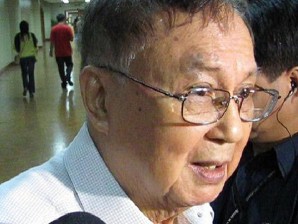MANILA, Philippines—Penalizing political butterflies flitting from one party to another through a law is one thing, but Senator Joker Arroyo warns it is the apparent lack of political maturity of many of those seeking elective posts that spells doom for a bill pending in the Senate that penalizes turncoats and provides for government subsidies to dominant political parties.
These are just some of the reasons Arroyo believes Senate Bill 3214 may not be passed at all in the remaining months of the 15th Congress that ends in June.
Aside from these issues, Arroyo asked why the bill would mandate the Commission on Elections to determine which political parties should receive part of the proposed P350-million state subsidy when its main task is to administer honest elections.
Arroyo also noted that with the Philippines’ multi-party system, the selection of subsidy beneficiaries would still be hard to justify despite the criteria laid down by the bill sponsored by Sen. Edgardo Angara.
“Ours is not like the US with only two parties and where it is unimaginable to switch memberships,” Arroyo said in a radio interview on Sunday.
Besides, the senator said, state subsidy to political groups that Angara insists would save them from being beholden to private donors “would not prevent political acrobats from somersaulting from one party to another.”
Arroyo said politicians switch parties depending on who won the last election.
In 1992, congressmen of the Laban ng Demokratikong Pilipino jumped aboard the Lakas-NUCD after President Fidel Ramos moved into Malacañang.
The same Lakas congressmen scrambled for slots in Laban ng Masang Pilipino when Joseph Estrada succeeded Ramos. And again, many returned to Lakas-NUCD after Estrada left Malacañang in haste in January 2001.
Angara, whose son Aurora Rep. Juan Edgardo Angara is running for senator, appealed for support for the bill he sponsored in plenary last August, saying the measure would make elections fairer and more equitable.
Angara stressed that the House of Representatives already approved its version on third and final reading.
Arroyo, however, said he was wary about whether the bill would pass Senate scrutiny at all.
He said the measure would address two things: turncoatism and subsidy. Congress should probably address the two issues separately, Arroyo said.
Angara’s bill lists three criteria warranting a portion of the P350-million campaign kitty: political representation; organizational strength and mobilization capability and performance and track record of the party.
Angara rationalized that government subsidy would prevent politicians from being beholden to campaign contributors and “professionalize and enhance the operations of political parties.”
Arroyo countered that the bill may look good on paper but the reality of Philippine elections is another.
For example, even if the Comelec selects which parties would get a subsidy, there are many cases in the local level where candidates for governor or mayor forge alliances with several parties – both national and local— to ensure their victory in an election.
Arroyo said the idea of state subsidy worked for political parties in the US and several European countries because they have a two-party system and the division of funds is limited to only two groups.
“The bill is very good but since it involves money…that would pose a lot of problems, like a lot of graft and corruption cases in the future,” he predicted.
Originally posted: 4:37 pm | Sunday, November 4th, 2012
